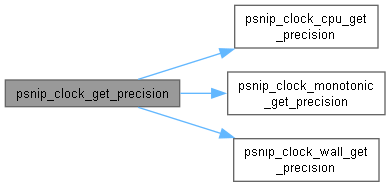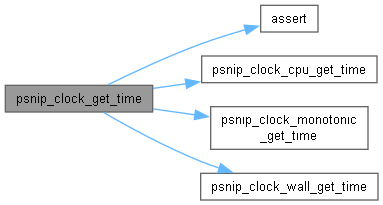#include <limits.h>#include <time.h>#include <errno.h>#include <string.h>#include <stdlib.h>#include <stdio.h>#include <stdarg.h>#include <setjmp.h>#include <locale.h>#include <langinfo.h>#include <strings.h>#include <unistd.h>#include <sys/types.h>#include <sys/wait.h>#include "munit.h"#include <assert.h>
Go to the source code of this file.
Data Structures | |
| struct | PsnipClockTimespec |
| struct | MunitReport |
| struct | MunitTestRunner |
Enumerations | |
| enum | PsnipClockType { PSNIP_CLOCK_TYPE_WALL = 1 , PSNIP_CLOCK_TYPE_CPU = 2 , PSNIP_CLOCK_TYPE_MONOTONIC = 3 } |
Macro Definition Documentation
◆ _POSIX_C_SOURCE
◆ ATOMIC_UINT32_INIT
◆ ATOMIC_UINT32_T
◆ munit_atomic_load
◆ munit_atomic_store
◆ MUNIT_ENABLE_TIMING
◆ MUNIT_NL_LANGINFO
◆ MUNIT_OUTPUT_FILE
◆ MUNIT_PRNG_INCREMENT
◆ MUNIT_PRNG_MULTIPLIER
◆ MUNIT_RESULT_STRING_ERROR
◆ MUNIT_RESULT_STRING_FAIL
◆ MUNIT_RESULT_STRING_OK
◆ MUNIT_RESULT_STRING_SKIP
◆ MUNIT_RESULT_STRING_TODO
◆ MUNIT_STRERROR_LEN
◆ MUNIT_STRINGIFY
◆ MUNIT_TEST_NAME_LEN
◆ MUNIT_TEST_TIME_FORMAT
◆ MUNIT_XSTRINGIFY
| #define MUNIT_XSTRINGIFY | ( | x | ) | MUNIT_STRINGIFY(x) |
◆ PSNIP_CLOCK__COMPILER_ATTRIBUTES
◆ PSNIP_CLOCK__FUNCTION
| #define PSNIP_CLOCK__FUNCTION PSNIP_CLOCK__COMPILER_ATTRIBUTES static |
◆ PSNIP_CLOCK_CPU_METHOD
| #define PSNIP_CLOCK_CPU_METHOD PSNIP_CLOCK_METHOD_CLOCK |
◆ PSNIP_CLOCK_H
◆ PSNIP_CLOCK_METHOD_CLOCK
◆ PSNIP_CLOCK_METHOD_CLOCK_GETTIME
◆ PSNIP_CLOCK_METHOD_GETPROCESSTIMES
◆ PSNIP_CLOCK_METHOD_GETRUSAGE
◆ PSNIP_CLOCK_METHOD_GETSYSTEMTIMEPRECISEASFILETIME
◆ PSNIP_CLOCK_METHOD_GETTICKCOUNT64
◆ PSNIP_CLOCK_METHOD_GETTIMEOFDAY
◆ PSNIP_CLOCK_METHOD_MACH_ABSOLUTE_TIME
◆ PSNIP_CLOCK_METHOD_QUERYPERFORMANCECOUNTER
◆ PSNIP_CLOCK_METHOD_TIME
◆ PSNIP_CLOCK_NSEC_PER_SEC
| #define PSNIP_CLOCK_NSEC_PER_SEC ((psnip_uint32_t) (1000000000ULL)) |
◆ PSNIP_CLOCK_UNREACHABLE
◆ PSNIP_CLOCK_WALL_METHOD
| #define PSNIP_CLOCK_WALL_METHOD PSNIP_CLOCK_METHOD_TIME |
◆ psnip_uint32_t
| #define psnip_uint32_t munit_uint32_t |
◆ psnip_uint64_t
| #define psnip_uint64_t munit_uint64_t |
Enumeration Type Documentation
◆ PsnipClockType
| enum PsnipClockType |
| Enumerator | |
|---|---|
| PSNIP_CLOCK_TYPE_WALL | |
| PSNIP_CLOCK_TYPE_CPU | |
| PSNIP_CLOCK_TYPE_MONOTONIC | |
Definition at line 334 of file munit.c.
Function Documentation
◆ munit_errorf_ex()
Definition at line 238 of file munit.c.
References MUNIT_LOG_ERROR.
◆ munit_logf_ex()
| void munit_logf_ex | ( | MunitLogLevel | level, |
| const char * | filename, | ||
| int | line, | ||
| const char * | format, | ||
| ... | |||
| ) |
Definition at line 221 of file munit.c.
Referenced by munit_malloc_ex().

◆ munit_malloc_ex()
Definition at line 281 of file munit.c.
References MUNIT_LOG_ERROR, munit_logf_ex(), MUNIT_SIZE_MODIFIER, and MUNIT_UNLIKELY.

◆ munit_parameters_get()
Definition at line 1075 of file munit.c.
References MunitParameter::name, and MunitParameter::value.
◆ munit_rand_double()
Definition at line 1028 of file munit.c.
References munit_atomic_load, and munit_uint32_t.
◆ munit_rand_int_range()
| int munit_rand_int_range | ( | int | min, |
| int | max | ||
| ) |
Definition at line 1015 of file munit.c.
References munit_rand_int_range(), munit_uint32_t, and munit_uint64_t.
Referenced by munit_rand_int_range().


◆ munit_rand_memory()
| void munit_rand_memory | ( | size_t | size, |
| munit_uint8_t | data[MUNIT_ARRAY_PARAM(size)] | ||
| ) |
Definition at line 971 of file munit.c.
References munit_atomic_load, and munit_uint32_t.
◆ munit_rand_seed()
| void munit_rand_seed | ( | munit_uint32_t | seed | ) |
Definition at line 913 of file munit.c.
References munit_atomic_store, MUNIT_PRNG_INCREMENT, and munit_uint32_t.
◆ munit_rand_uint32()
| munit_uint32_t munit_rand_uint32 | ( | void | ) |
Definition at line 942 of file munit.c.
References munit_atomic_load, and munit_uint32_t.
◆ munit_suite_main()
| int munit_suite_main | ( | const MunitSuite * | suite, |
| void * | user_data, | ||
| int | argc, | ||
| char *const | argv[MUNIT_ARRAY_PARAM(argc+1)] | ||
| ) |
Definition at line 2094 of file munit.c.
References munit_suite_main_custom().
Referenced by main().


◆ munit_suite_main_custom()
| int munit_suite_main_custom | ( | const MunitSuite * | suite, |
| void * | user_data, | ||
| int | argc, | ||
| char *const | argv[MUNIT_ARRAY_PARAM(argc+1)], | ||
| const MunitArgument | arguments[] | ||
| ) |
Definition at line 1867 of file munit.c.
References MunitTestRunner::colorize, MunitReport::cpu_clock, MunitTestRunner::current_suite, MunitReport::errored, MunitReport::failed, MunitTestRunner::fatal_failures, MunitTestRunner::fork, MunitTestRunner::iterations, MUNIT_LOG_DEBUG, MUNIT_LOG_ERROR, MUNIT_LOG_INFO, MUNIT_LOG_WARNING, MUNIT_OUTPUT_FILE, munit_uint32_t, MunitParameter::name, MunitTestRunner::parameters, MunitArgument_::parse_argument, MunitTestRunner::prefix, MunitTestRunner::report, MunitTestRunner::seed, MunitTestRunner::show_stderr, MunitTestRunner::single_parameter_mode, MunitReport::skipped, MunitReport::successful, MunitTestRunner::suite, MunitTestRunner::tests, MunitTestRunner::user_data, MunitParameter::value, and MunitReport::wall_clock.
Referenced by munit_suite_main().

◆ psnip_clock_cpu_get_precision()
| PSNIP_CLOCK__FUNCTION psnip_uint32_t psnip_clock_cpu_get_precision | ( | void | ) |
Definition at line 603 of file munit.c.
References PSNIP_CLOCK_NSEC_PER_SEC.
Referenced by psnip_clock_get_precision().

◆ psnip_clock_cpu_get_time()
| PSNIP_CLOCK__FUNCTION int psnip_clock_cpu_get_time | ( | struct PsnipClockTimespec * | res | ) |
Definition at line 618 of file munit.c.
References PsnipClockTimespec::nanoseconds, PSNIP_CLOCK_NSEC_PER_SEC, and PsnipClockTimespec::seconds.
Referenced by psnip_clock_get_time().

◆ psnip_clock_get_precision()
| PSNIP_CLOCK__FUNCTION psnip_uint32_t psnip_clock_get_precision | ( | enum PsnipClockType | clock_type | ) |
Definition at line 733 of file munit.c.
References psnip_clock_cpu_get_precision(), psnip_clock_monotonic_get_precision(), PSNIP_CLOCK_TYPE_CPU, PSNIP_CLOCK_TYPE_MONOTONIC, PSNIP_CLOCK_TYPE_WALL, PSNIP_CLOCK_UNREACHABLE, and psnip_clock_wall_get_precision().

◆ psnip_clock_get_time()
| PSNIP_CLOCK__FUNCTION int psnip_clock_get_time | ( | enum PsnipClockType | clock_type, |
| struct PsnipClockTimespec * | res | ||
| ) |
Definition at line 750 of file munit.c.
References assert(), psnip_clock_cpu_get_time(), psnip_clock_monotonic_get_time(), PSNIP_CLOCK_TYPE_CPU, PSNIP_CLOCK_TYPE_MONOTONIC, PSNIP_CLOCK_TYPE_WALL, and psnip_clock_wall_get_time().

◆ psnip_clock_monotonic_get_precision()
| PSNIP_CLOCK__FUNCTION psnip_uint32_t psnip_clock_monotonic_get_precision | ( | void | ) |
Definition at line 661 of file munit.c.
References PSNIP_CLOCK_NSEC_PER_SEC, and psnip_uint32_t.
Referenced by psnip_clock_get_precision().

◆ psnip_clock_monotonic_get_time()
| PSNIP_CLOCK__FUNCTION int psnip_clock_monotonic_get_time | ( | struct PsnipClockTimespec * | res | ) |
Definition at line 683 of file munit.c.
References PsnipClockTimespec::nanoseconds, PSNIP_CLOCK_NSEC_PER_SEC, psnip_uint64_t, and PsnipClockTimespec::seconds.
Referenced by psnip_clock_get_time().

◆ psnip_clock_wall_get_precision()
| PSNIP_CLOCK__FUNCTION psnip_uint32_t psnip_clock_wall_get_precision | ( | void | ) |
Definition at line 562 of file munit.c.
Referenced by psnip_clock_get_precision().

◆ psnip_clock_wall_get_time()
| PSNIP_CLOCK__FUNCTION int psnip_clock_wall_get_time | ( | struct PsnipClockTimespec * | res | ) |
Definition at line 577 of file munit.c.
References PsnipClockTimespec::nanoseconds, and PsnipClockTimespec::seconds.
Referenced by psnip_clock_get_time().
